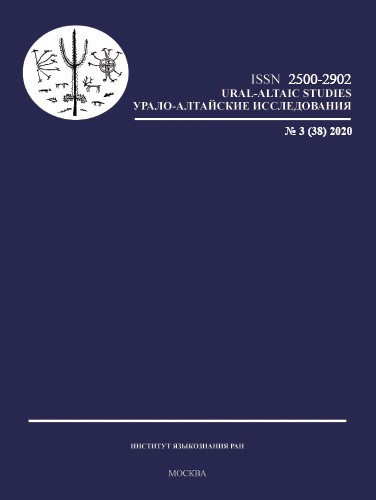Наименования духов-хозяев в башкирской мифологии
Names of local spirits in Bashkir mythology
Author(s): Firdaus Khisamitdinova, Zarema Nazirovna EkbaSubject(s): Cultural history, Customs / Folklore, Comparative Studies of Religion, Semantics, Ethnic Minorities Studies, History of Religion
Published by: Институт языкознания Российской академии наук
Keywords: the Bashkir language; Bashkir dialects; Turkic mythology; master spirits; guardian spirits; spirit-helpers; pagan beliefs of the ancient Turkic ethnic group;
Summary/Abstract: The article is devoted to the analysis of the names of characters in Bashkir mythology eyälär / eyelär ‘host spirits’. According to the ideas of the ancient Bashkirs, eyälär ‘spirits’ are the owners, patrons of various objects, localities, natural elements, rooms, time periods, as well as assistants to shamans-Baksa and other “knowledgeable people”. From the point of view of origin, host spirits, patron spirits, judging by their functions and terminology, go back to the earliest shamanistic ideas of the Turks. The study revealed the attraction of some types of naming to certain dialect zones. The most common name eyä / eye ‘spirit, master’ is common Bashkir (and common Turkic); the second components of the names of spirits huzha ‘master’ and baba ‘grandfather, old man’ can be quite reliably connected with the North-Western and Southern dialect zones; ana / inä ‘mother’ is also General Bashkir; batsha ‘king’ tends to the Eastern dialect; äbi / äbey ‘grandmother, old woman’ — to the North-Western. All other names do not have such a wide distribution that would allow drawing reliable conclusions about their dialect affiliation. There is a significant influence of the Islamic religion on the mythology of Bashkirs: some Muslim saints gradually take over the functions of patron spirits in the national consciousness, which is reflected in the language and spiritual culture. In the folk art of the Bashkirs, we find numerous examples of contamination of spirits’ names — the ones of the pagan period with the ones containing the names of Muslim saints. Some names of host spirits have correlation in other Turkic languages, primarily closely related ones, in particular, names with the use of the second component of the names of kinship ana / inä ‘mother’, ata / baba ‘father’. According to the semantics and functions performed, patron spirits associated with the ancestral cult are mostly close to this category of supernatural beings — similar names are found in many other Turkic languages and go back to the shamanistic ideas of the ancient Turkic ethnic group.
Journal: Урало-алтайские исследования
- Issue Year: 2020
- Issue No: 03 (38)
- Page Range: 111-129
- Page Count: 19
- Language: Russian

